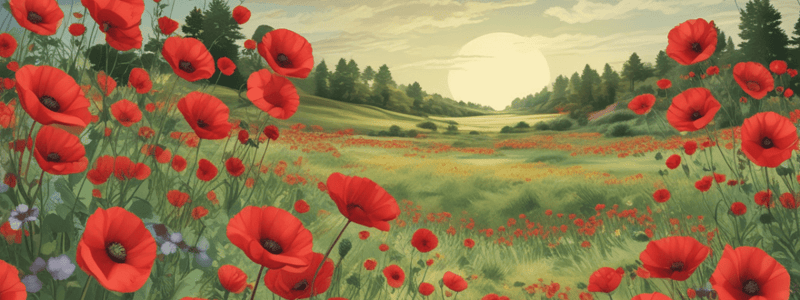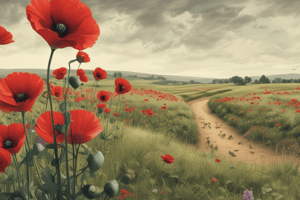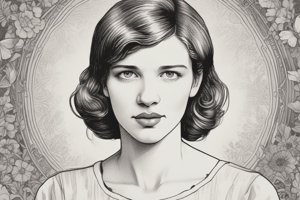Podcast
Questions and Answers
What does the phrase 'it exhausts me' suggest about Plath's mental state?
What does the phrase 'it exhausts me' suggest about Plath's mental state?
That Plath is actively giving in to her darkness and pain, almost masochistically.
What does the line 'Little bloody skirts!' suggest about Plath's emotional state?
What does the line 'Little bloody skirts!' suggest about Plath's emotional state?
That Plath is experiencing a sense of discomfort and unease, possibly relating to her own experiences of miscarriage and trauma.
What is the significance of the final line 'But colorless. Colorless.'?
What is the significance of the final line 'But colorless. Colorless.'?
That it represents a sense of hopelessness and emptiness, devoid of any emotional or physical relief.
Study Notes
Poem Overview
- "Poppies in July" is one of Sylvia Plath's darkest poems, expressing a desire to harm herself or be numbed from her depression.
- The title has a warm and appealing sound, but this gives way to a darker meaning in the context of the poem.
Themes and Ideas
- Self-harm: expressed through the speaker's desire to hurt themselves or be numbed from suffering.
- Mental health: the speaker's depression and emotional turmoil are central to the poem.
- The desire to feel numb: the speaker wants to escape their emotional pain.
- Respite found through nature: the speaker looks to the poppies for a way to feel numb or escape their suffering.
Style
- Musical rhythm: used to mask the disturbing content initially.
- Repetition: used to create a sense of rhythm and musicality.
- Caesura: used to create a sense of pause and emphasize the speaker's frustration.
- Provocative imagery: used to create vivid and disturbing images in the reader's mind.
- Simile: used to compare the poppies to hell flames.
- Synecdoche: used to refer to the poppies as "little hell flames".
- Alliteration: used to create a sense of musicality and rhythm.
Analysis of Key Quotes
- "Little poppies, little hell flames, / Do you do no harm?" - The opening lines are rhythmic and playful, but quickly become sinister.
- "You flicker. I cannot touch you. I put my hands among the flames. Nothing burns." - The speaker tries to hurt themselves using the metaphor of fire, but fails.
- "And it exhausts me to watch you / Flickering like that, wrinkly and clear red, like the skin of a mouth." - The speaker's mental anguish is captured in the phrase "it exhausts me".
- "A mouth just bloodied. Little bloody skirts!" - The mood becomes violent as the speaker connects the image of the mouth to one that has been harmed.
- "There are fumes that I cannot touch. Where are your opiates, your nauseous capsules?" - The speaker calls out to the flowers for a way to feel numb or escape their suffering.
- "If I could bleed, or sleep! – / If my mouth could marry a hurt like that!" - The speaker wants to feel physical pain or sleep to distract themselves from their emotional turmoil.
- "Or your liquors seep to me, in this glass capsule, / Dulling and stilling." - The speaker wants the seeds of the poppy to end their suffering and still their emotional turmoil.
- "But colorless. Colorless." - The final line is devoid of hope, emphasizing the speaker's emotional turmoil.
Studying That Suits You
Use AI to generate personalized quizzes and flashcards to suit your learning preferences.
Description
Delve into the dark themes and symbolism in Sylvia Plath's poem 'Poppies in July', exploring her struggles with depression and self-harm.




